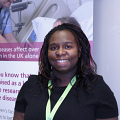What I think about when I think about research
Nailah Brown, talks about her experience of what it takes to run a great research study.
When you think of conducting a really high-quality research study, what do you think about? Accurate data? High recruitment numbers? Hitting your milestones to time and target? Of course, these are all essential aspects of high standard studies, but that’s not the only thing I think about when I think about research. I think about people.
Like anybody in research, my aim is to produce great data, but my job is really about relationships. At the end of the day, the reason we do what we do is to help people, and the best way to have a successful study, and meaningful outcomes, is to really try and understand the people you’re trying to help.
One of the main jobs of a research team is to recruit, and many of us become obsessed with our targets at this stage – are we getting the right number of people into the study. Are we recruiting at the right pace? These are very important considerations, but once we’ve hit our recruitment target, it’s easy to start focusing on other things, and sometimes we disregard another essential factor of research: retention. After all, what’s the point of recruiting 100 people to a study if only 20 stick around until the end? With that much incomplete data, your results are severely compromised.
I’ve made engagement with patients and the teams that I work with, especially in paediatric ENT, the focus of my work. My advice to others in research is to build relationships wherever you can.
Make friends not only with your own team, but with the clinical teams, and for example: with the theatre schedulers, porters and with the secretaries. Recognise how much each of these people has to contribute to the process of conducting great research and start to see the hospital as a whole: there is no dividing line between researchers and clinicians, we both need each other.
Clinical teams offer me time out of their busy schedule so I like to give them a little of mine too. I am clinically trained, so I have pitched in when it is appropriate, for example by weighing patients or fetching notes. By doing this, I get to know nurses and clinicians and they get to know about me and my study. Before long, they are calling to tell me about a patient who meets my criteria, or to let me know a study participant is coming in for a check-up: an opportunity for me to pop down and ask them how they’re finding the research; remind them they have a questionnaire to fill out!
And that’s the other essential part of relationship building in research: understanding and empathising with participants, their loved ones and their communities. I always say:
you don’t just recruit the patient, you recruit the family,
so make sure you talk to them too. You might have a participant who’s really enthusiastic, but what does their mum think? If she has worries, the patient might think twice about continuing with the study. I like to tell participants about my own experiences of research and how I have enrolled my daughter in studies too. Hearing that my family and I take part helps to reduce any anxieties patients have.
Aside from psychological boundaries, there are practical ones, and this is where it is useful to get feedback from patients before you even start your research. Are your patient materials readable and easy to understand? Talking with different groups (religious or cultural) can help you design studies and provide information in a format that may suit a certain group better. Are your questionnaires confusing? Is the study designed to be convenient and comfortable for patients? For example, does an asthma sufferer really care about their peak flows results? Or are they more concerned about how many times they have to take their inhaler? Fit the research to the patient and recruitment and retention becomes a lot easier. But even with a well-designed study, people still drop out. I sometimes ask participants if there is a particular reason why they don’t want to take part. I stress to them that they don’t have to tell me but often they do. They might give you information that helps improve retention rates in your next study.
But even if you have the perfect study for the perfect participant, we all have lives, and it’s easy for participants to forget about their questionnaires or appointments. I’ve found that a friendly phone call now and then helps keep the study in the forefront of their minds and puts a human face on a subject that can otherwise seem cold and clinical. I answer any questions they have and signpost them to the right doctors if they have clinical queries. After all,
I believe in giving something back to the patients who take time out of their own lives to help us find new tests and treatments. Without them, there would be no studies, so theirs is perhaps the most important role of all.





